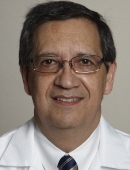Specialties
Research
Education
MD, Universidad de Chile, Facultad De Medicina
Residency, Internal Medicine, Brooklyn Hospital-Caledonian Hospital
Residency, Internal Medicine, Brooklyn Hospital-Caledonian Hospital
Fellowship, Nephrology, SUNY Downstate Medical Center
Certifications
American Board of Internal Medicine
Publications
Publications
Selected Publications
The Hispanic American longevity paradox: Sofrito and beyond. Jaime Uribarri, Lorena Drago, Arnold R. Eiser. Journal of Internal Medicine
Survey of Peritoneal Dialysis Patients' Challenges and Experiences during the COVID-19 Pandemic: A Multicenter Study in the United States. Farah Abifaraj, Dale Lee, Meghan Lacovara, Tarun Kapoor, Rebecca Seshasai, Shweta Bansal, Robert Greevy, Andrew Guide, Shuchita Sharma, Jaime Uribarri, Osama El Shamy. Kidney360
Industrial Use of Phosphate Food Additives: A Mechanism Linking Ultra-Processed Food Intake to Cardiorenal Disease Risk?. Mona S. Calvo, Elizabeth K. Dunford, Jaime Uribarri. Nutrients
View All Publications
Video

